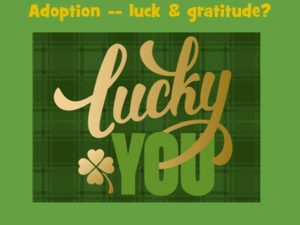
During this month folks who are Irish –literally or metaphorically– celebrate St. Patrick’s Day. Like many holidays, a non-sectarian sense of fun has overtaken the religious aspects of the day’s origins. So what does St. Patrick’s Day have to do with adoption? The “luck of the Irish” comes to mind. Luck…a term easily tossed around. And often hurled in the face of adoptees.
Luck is also something which adoptees are expected to feel about being adopted. Many have written eloquently on this absurd and painfully invalidating notion. This is often coupled with the equally offensive idea that they ought to “get over it,” quit whining about being adopted, “be glad they weren’t aborted,” and relinquish any interest in and/or connection with their birth parents and first families, etc.
From the day our first child was placed in my arms thirty-one years ago, I believed I understood the tragedy at the roots of our joy. As the years have unfolded, however, I realize that the enormity of this life-long loss cannot be parsed by anyone who is not actually an adoptee or birth parent. When cancer destroyed my ability to conceive, no one ever suggested to fifteen-year-old me that I should feel lucky for having cancer or lucky for being rendered sterile. The very notion is ridiculous. But isn’t this (to be “grateful” for being adopted) the expectation that is often flung in the faces of our children? So how do we best support our children and free them from the crushing weight of such societal expectations?
As parents committed to intentionality, we understand the pivotal role of relationship. It is the key to attachment, the conduit to connection, family building and the establishment of unified family values. Relationship requires mutual trust, respect, empathy and genuine caring about each other’s needs both physical and emotional. How can we best empathize with our children’s adoption-shaped emotions? We must recognize that there is a profound “conflict of interest” around their being adopted. Adoption created one of our greatest joys: we received a child into our hearts and families but it also caused a primal loss of our children’s first families. These two factors do not cancel each other out; they coexist. As with so much about adoption, we are called upon to hold a both/and mentality. We can be joy-filled because our children are part of our lives and simultaneously be heart-broken “for” them because of their huge loss.
Most of us–unless we ourselves are also adopted–can not truly understand their emotional reality. The closest we can come is probably connecting to our own infertility losses and imagining how we would feel if people regularly expected us to be grateful for our infertility. Or how we might force a smile in the face of being told how lucky we are to have avoided the discomfort of pregnancy when in fact we grieve the loss of not having that nine months of shared intimacy. I believe most of us have felt gut-punched by such callous remarks. To some extent, I suppose we can be grateful for such emotional hand grenades as it is a way of nurturing empathy for our children’s plight. Like our children, we too, hold a both/and reality with our own emotions because while adoption provided us children to love and graft into our families it did not cure infertility.
Intentional families are lucky in one way: they exist in a level of awareness committed to thinking deeply about their choices, language, methods and emotions and who, therefore, raise their consciousness to a level often missed by those who operate on auto-pilot because life hasn’t rocked them out of this comfort zone.
Listen to our podcasts: Adoption Matters: Real People. Real Life. Real Talk and Essentials of Adoption Attuned Parenting
Read Books written by our coaches
Click to learn more about Adoption Attuned Certified coaching!



It is so important for adoptive parents to be intentional. And, if I were to say what “luck” has to do with it, I would say adoption made me into a better mother and person. My children, through adoption, gave me that gift.
Over the years I have often heard said to me or my children how lucky they were. Luck in this case, as you point out, is relative since our children being with us also required a deep loss of their birth families and cultures. It is fundamental to keep this in mind and allow the “luck” to coexist with the loss.